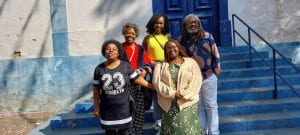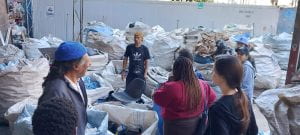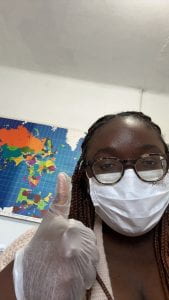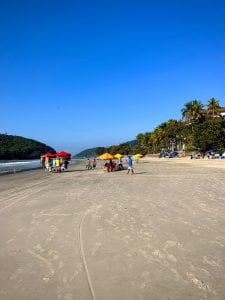I have been in São Paulo for the past two months in which I have participated in a program through Mackenzie Presbyterian University focused on developing sustainable solutions to water management within the city. The program included a variety of courses to develop our understanding of the historical and sociocultural context of Brazil along with more technical visits to build our knowledge on the social issue of water sustainability all leading up to the culminating project to address these challenges with a community-based solution. In addition to us two Rice students, various Mackenzie students also participated in the program with us and also greatly supported our experience here.

Us on Mackenzie campus the first day with the Mackenzie students that took part in the program
Prior to coming to São Paulo, I had only ever lived in Houston for the entire 20 years of my life and had only left the United States once for a short family trip to Taiwan many years ago. So it was safe to say that traveling to a completely different country to live for over two months where I knew no one and barely even understood the language was an extremely daunting decision to make. However, I knew that this experience would be too important to so easily give up and spend my summer sticking to my usual routine in Houston with research in the medical center followed by the long drive back to my home in Sugar Land in rush hour traffic.
My primary motivation for choosing to work with Mackenzie here in São Paulo was due to my interest in the topic of water sustainability and how that impacted the health and wellbeing of communities throughout the city. Challenges with waterway pollution and flooding along the Gulf Coast has been my primary focus for the past year while developing an Alternative Spring Break program. Therefore, I was hoping to see how this similar social issue would manifest in a city that has entirely different historical and social contexts to ultimately gain greater perspective as to how the environment impacts health and how there are different approaches to developing solutions to these challenges.

The construction site for the underground rain reservoir
While our program with Mackenzie involved visiting many different museums to explore the significant history and beautiful art of São Paulo, one of our earlier technical visits was to a construction site that seemed to just be a large dirt pit. However, this unassuming area was actually being built into one of the many underground rain reservoirs throughout the city designed to hold thousands of cubic meters of water during large flooding events to then be slowly released into the city’s drainage system. During the visit, the managers of the project also explained that the plans for the site included building a large recreational park on top of the reservoir so that the space could still be utilized by the community. Although this flood prevention intervention is likely not directly applicable to the severe flooding we commonly face in Houston, there can still be a valuable exchange of knowledge as to what approaches are possible in the face of destructive floods plaguing both cities and only worsening as a result of climate change.

The CETESB headquarters and one of the research labs inside that studies how pollutants affect native organisms
Another experience that provided greater understanding of water management in São Paulo was visiting the Companhia Ambiental do Estado de São Paulo (CETESB), which serves a comparable role to the Environmental Protection Agency (EPA) or Texas Commission on Environmental Quality (TCEQ) in which their purpose is to monitor and enforce water quality in the state’s waterways by conducting research regarding the effects of pollutants on the health of surrounding communities. While speaking with many researchers at CETESB’s facility, it was apparent that their main priority was to communicate concerns about water quality to the public and encourage improved conditions over time to minimize the risk of harming the health of local ecosystems and people who are most often exposed to those pollutants. Learning about the work of CETESB was an insightful experience for how research efforts from government agencies can play a large part in promoting improved environmental health regulations, which is especially crucial to demonstrate back in the United States now that the scientific research division of the EPA was recently eliminated.

The sorting area of the Revira Revolta recycling collective and a group photo with us and the Mackenzie students in front of a mural inside the center
In addition to these technical visits, one of the most impactful visits during our program was to the Revira Volta recycling collective. This organization had a unique mission to support individuals experiencing homelessness by employing them to sort recyclable materials and then using the profits from selling the sorted materials to pay their salaries. However, even more importantly than solely providing a source of income, the recycling collective emphasized that their primary goal was to provide beneficial resources like counseling services or legal assistance to eventually allow their employees to find housing and educational or career opportunities. Meeting with this organization was an inspiring visit that demonstrated how a community-founded organization could develop such an innovative solution to substantially improve the lives of others. From my previous interactions with many similarly community-based grassroots organizations in Houston, Revira Volta further provided a broader global context as to how centering the needs of the community is most important for creating change.

Images of the Pinheiros River from the large open windows of the Santo Amaro station
Even outside of our program with Mackenzie, the challenges of waterway pollution throughout São Paulo were evident as we explored the city on our own time. When our plans to take the bus to the beach one weekend fell through once we arrived at the station and realized our passports were required to purchase a ticket, we instead rerouted to Parque Villa-Lobos through the subway system to still enjoy a sunny day outside. On the way to the park, we passed through the Santo Amaro station where we could see the joining of the Jurubatuba and Guarapiranga rivers to form the Pinheiros River, a major tributary running through the city of São Paulo. Just a few years ago, the Pinheiros River was highly contaminated with sewage wastes, and our friends here even described how a pungent smell would emanate from the water when walking nearby. However, the recently implemented Novo Rio Pinheiros program to clean up the river has drastically improved the water quality to benefit the lives of thousands throughout the city. While there is still more work to be done to continue improving the water quality, even just admiring the view while walking through the station without worrying about encountering any unsavory odors shows how protecting the health of our local waters can be such a beneficial investment. In Houston where we are similarly accustomed to polluted waters, like Buffalo Bayou or the San Jacinto River in the Greater Houston area, there should be greater incentive to take on these large scale projects to also improve our region’s waterways and therefore benefit the health and wellbeing of our community as well.

A blurry picture of flaring in Cubatão (left) on the way back from the beautiful Santos beach (right)
Finally, one of the most striking similarities was pointed out to me as we were on our way to Santos beach, a little over an hour away from the city. Along the route, I was mesmerized by the endless towering green mountains stretching into the distance contrasting with the brilliant blue sky and even made the comment to one of our friends here that I appreciated the view much more than what I have accepted as the normal beach trip scenery of industrial facilities and large billboards lining the freeway to Galveston. However, as we made our way around another mountain, my friend pointed out that we were coming upon the city of Cubatão that was known for its industrial facilities. In fact, the city was even known as the “Valley of Death” in the late 20th century due to the various illnesses that arose from the looming presence of carcinogenic pollutants in the environment. Since then, the city has drastically lowered its pollutant levels by increasing regulation of industry and implementing environmental restoration programs. While there is still more work to be done to improve pollution levels in the city, I was struck by the parallel with fenceline communities throughout Houston where community members similarly face health conditions due to exposure to pollutants from the petrochemical industry.
From the knowledge that we accumulated during our time exploring São Paulo and how water management challenges manifest, we completed our final social impact project that focused on improving basic sanitation of underserved communities in São Paulo that do not have access to sewage systems. While completing this project with our mentoring professor, one of my most memorable interactions was when he expressed how lack of basic sanitation is an issue that is likely very uncommon in Houston. But I then explained how there are many homes throughout the Houston area that are still burdened by the inadequately maintained sewage systems, which was a surprising revelation to our professor who had assumed this would not be the case in the United States. While it is unreasonable to expect us American college students to develop a solution that is entirely applicable to São Paulo, it is from these similarities of centering the voices of those who are directly affected and facilitating open discussions to push for innovative ideas from which possibilities begin to arise.

The final presentation of our social impact project with the other Mackenzie students and professors who took part in our water sustainability program
There are most certainly distinctions between the cities that emerge from historical, political, and cultural differences, but there is no denying that vulnerable populations are most often confronted with the brunt of social injustices due to the long lasting systemic inequities that arise from a history of colonization, the institution of slavery, and continued exploitation of minority groups. While challenges to water sustainability are far from being resolved in either São Paulo or Houston, the comparison in developing solutions either through small scale community-based efforts or broader government-backed programs, provides hope that working towards a future in which we no longer experience the effects of these social issues is not impossible to envision.
As I finish writing this blog post with only a few days left in my Loewenstern experience, I believe the final most important similarity between São Paulo and Houston is that I have found such a loving and passionately engaged community within both cities. I am overwhelmingly grateful for the many people who were immediately so welcoming of us and made sure that it never felt like I was very far from home even while nearly 5000 miles away from Houston because I ultimately found a home here in São Paulo as well. During a time when the societal divisions and distrust seem greater than ever, participating in global experiences like Loewenstern is one of the best methods for recognizing how profoundly connected we are to one another despite geographical distances or cultural differences. There is greater hope in knowing that we are bound by a shared desire to build a global community and work together towards an even more beautiful future. When I get back to Houston, I will terribly miss so many aspects of this city like the efficient public transport, scrumptious açaí bowls, impressively towering trees, and most importantly the many people with whom I have so quickly formed meaningful lasting relationships.

One of the majestic figueira trees that can be found all around São Paulo (left), a bowl of the best açaí ever with strawberries and condensed milk toppings (middle), and an outing with our new friends here whom I deeply cherish (right)
My time in São Paulo will forever inform my perspectives on addressing social issues and has also allowed me to expand my connections much further than I ever could have imagined before this experience. From my heartfelt gratitude for this city and its people, I intend to come back as soon as possible. But until then, I will spend these last few days continuing my search for a capybara sighting along the city’s riverbanks. Eu te vejo logo São Paulo!! 🫶🫶
If you have absolutely any questions or want to learn more about my experience this summer, please feel free to e-mail me at lyl1000@rice.edu! 😊😊













